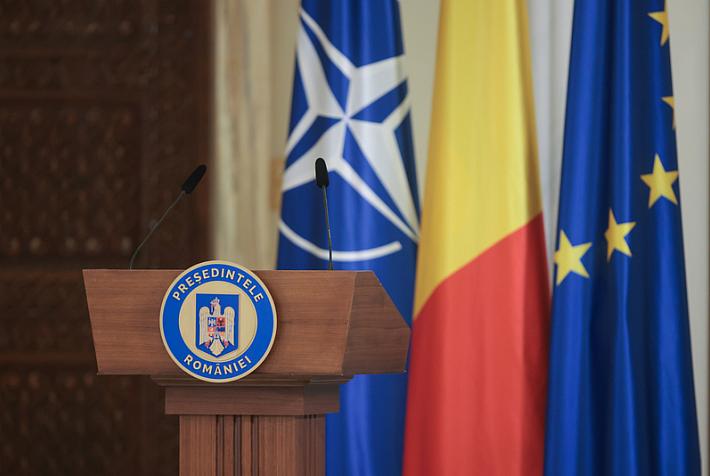A promenade on the Croisette: Romanian film at Cannes

Simona Fodor looks at Romania's history at the Cannes film festival.
Romanian cinema has had a landmark moment at this year’s edition of the Cannes film festival, with five films included in various sections of the festival, two of which in the main competition.
The 2007 Palme d’Or winner Cristian Mungiu was competing with the 2005 Un Certain Regard award winner Cristi Puiu and alongside names such as Maren Ade, Jim Jarmusch, Xavier Dolan, Pedro Almodovar or the Dardenne brothers.
Three other Romanian films were present in official sections of the festival. Bogdan Mirica’s film Câini (Dogs) was selected in the Un Certain Regard section, and won the FIREPESCI award on May 21. 4:15 p.m. sfârşitul lumii (4:15 p.m. the end of the world), directed by Cătălin Rotaru and Gabi Virginia Sarga, was selected in the official short films competition, while Alexandru Badea’s Toate fluviile curg în mare (All Rivers Run to the Sea) was selected in the Cinéfondation section. A solid participation from a country where local productions are faced with a thin distribution network.
Beyond the extent of this year’s participation, Cannes is a place where films get discovered and Romania’s historical track record at the festival also highlights the local industry’s development and ups and downs throughout the years. More than twenty Romanian films were screened in various sections of the festival since its first edition. Only one Romanian director received a Palme d’Or for a feature film but more than ten directors have been awarded festival prizes, especially after the year 2000. A look at them bellow.
The first Romanian films selected in the Cannes film festival were at the event’s first edition, in 1946. They were Floarea Reginei (The Queen’s Flower), directed by Paul Calinescu, shown in the main competition, and Rapsodia Rustică (The Rustic Rhapsody), directed by Jean Mihail, screened in the shorts section. The 20-minute long Floarea Reginei is an adaptation after a story written by Carmen Sylva (the pen name of Queen Elisabeta of Romania). Jean Mihail’s Rapsodia Rustica deals with the life in Romanian villages in the period after the war.
The first Romanian short film to win a Palme d'Or award in Cannes was Scurtă Istorie (Brief History) directed by Ion Popescu Gopo. It won in 1957 the Palme d'Or du court métrage. Director Ion Popescu Gopo is known to local audiences for creating the animated Little Man (Omulețul), the nude human figure raising subjects related to various issues of contemporary world and one of the best-known Romanian cartoons character.
The same year, 1957, another Romanian film was selected in the official competition. It was Victor Iliu’s La Moara cu Noroc (The Mill of Good Luck). Two other selections in the official competition followed. They were Telegrame (Telegrams), directed by Aurel Miheleș and Gheorghe Naghi, in 1959 and S-a furat o bombă (A bomb was stolen), directed by Ion Popescu Gopo, in 1962.
Three Romanian films won awards at Cannes in the 1960s. In 1965 Romanian director Liviu Ciulei won in Cannes the Best Director award for Pădurea Spânzuraților (The Forest of the Hanged). Based on the canonical Romanian novel of the same name, written by Liviu Rebreanu, the black-and-white film featured young Romanian actor Victor Rebengiuc in the leading role.
Another award went to a Romanian filmmaker the following year. Mircea Mureșan won in 1966 the award for Best Debut for the film Răscoala (The Riot). The movie is based on the novel of the same name authored, again, by Liviu Rebreanu and follows the leading character through significant events related to the 1907 Romanian Peasants’ Revolt, caused by discontent regarding unfair land ownership and leasing rules.
Director Mirel Ilieșiu took home the Grand Prix International du Festival in the Short Films section for the documentary Cîntecele Renașterii (The Songs of the Renaissance). The film centers on the activity of local choir Madrigal, a chamber music choir established in 1963 by conductor Marin Constantin.
Until 1994 only one Romanian film received a nomination in Cannes. It was director Nicolae Breban who was selected in 1971 in the official competition with the film Animale Bolnave (Sick Animals). Romanian novelist and essayist Nicoale Breban, today a member of the Romanian Academy, directed and wrote the script for the film, starring Mircea Albulescu and Ion Caramitru, among others.
Throughout the 90s, three Romanian films were nominated at Cannes in the official competition. These are: O vară de neuitat (An Unforgettable Summer) directed by Lucian Pintilie in 1994, Senatorul melcilor (The Snails Senator) directed by Mircea Daneliuc in 1995 and Prea târziu (Too Late) directed by Lucian Pintilie in 1996. O vară de neuitat stars Kristin Scott Thomas, Claudiu Bleonţ, Olga Tudorache and George Constantin and follows the consequences of xenophobia and state-sanctioned repression. A comedy, Senatorul Melcilor follows senator Vârtosu as he comes to inaugurate a wind-powered installation in a mountain locality and is met by discontented inhabitants. Prea târziu centers on an investigation into the suspicious death of a Jiu Valley coal miner.
Starting with the years 2000 Romanian film has gathered accolade after accolade. Cătălin Mitulescu’s film Trafic won in 2004 a Short Film Palme d’Or. The movie captures the protagonist as he is stuck in traffic, dealing with various aspects of his life. The following year, Cristi Puiu received the Un Certain Regard award for Moartea domnului Lăzărescu (The Death of Mr. Lazarescu). Part of the festival’s official selection, the section recognizes young talent and aims to encourage innovative films. Based on a real case, the film narrates the final hours in the life of Dante Remus Lăzărescu, a retired engineer who is carried by an ambulance from hospital to hospital all night long, as doctors keep refusing to treat him. Corneliu Porumboiu won in 2006 the Caméra d’Or prize for A fost sau n-a fost? (12:08 East of Bucharest), a film where the characters are trying to determine whether there was a 1989 revolution in their town or not. The same year actress Dorotheea Petre received the Best Actress award in the Un Certain Regard section for her performance in Cum mi-am petrecut sfarșitul lumii (How I Spent the End of the World).
In 2007 Cristian Nemescu won the Un Certain Regard award for California Dreamin', a movie about a train transport on its way to Kosovo that gets delayed in a small village in Romania. The same year, Cristian Mungiu won the Palme d’Or and the first such award granted to a Romanian director for 4 luni, 3 săptămâni și 2 zile (4 Months, 3 Weeks and 2 Days), a drama about two women arranging an illegal abortion during the 1980s communist Romania. Two years later, in 2009, Corneliu Porumboiu received another award in Cannes: the jury award in the Un Certain Regard section for Polițist, adjectiv (Policeman, Adjective), a film following a young detective trying to uncover a drug network.
At its second participation in Cannes in 2012, Cristian Mungiu took home the Best Screenplay award for Dupa Dealuri (Beyond the Hills), the drama based on the real case of the death of a young woman after an exorcism ritual at a monastery in Moldavia. The leading actresses in the film, Cosmina Stratan and Cristina Flutur, shared the Best Actress award.
In 2015, Corneliu Porumboiu’s film Comoara (The Treasure) received the Un Certain Talent award in the Un Certain Regard section. The film details the quest of two neighbors for a buried treasure and depicts various aspects of Romanian society along the way.
The list of awards remains open and, regardless of the nods received or not at this edition of the Cannes festival, the year a significant one for Romanian film.
Simona Fodor, associate editor, simona@citycompass.ro











